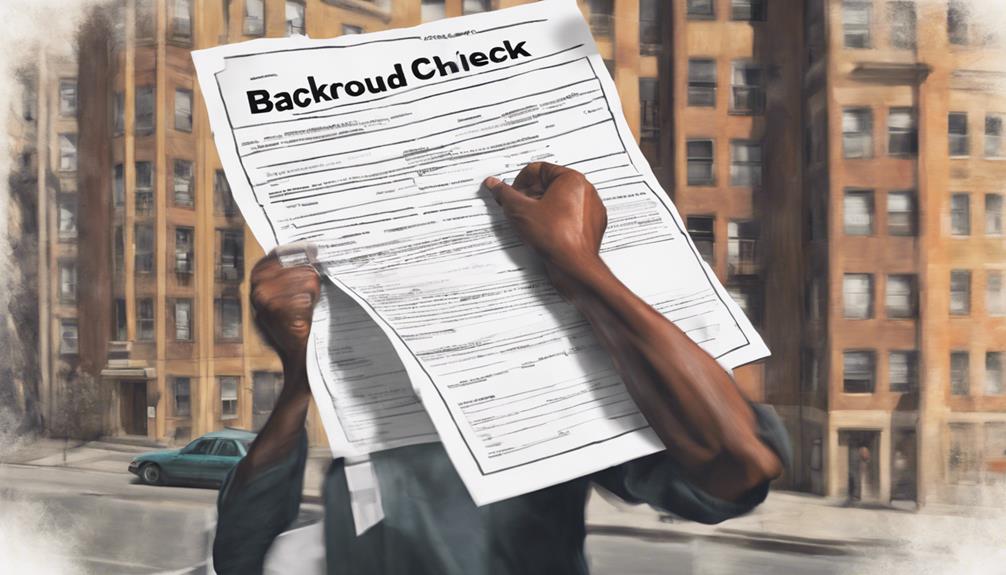Understanding ministry background checks is essential for legal compliance and safety in religious settings. It involves adhering to federal laws like the FCRA and EEOC guidelines. Customized checks tailored to different roles within the ministry guarantee adequate protection. Securing volunteers undergo thorough screening reassures parents and the community. By focusing on felony convictions and making job offers contingent on clear conditions, the process aims to safeguard both the organization and applicants. Evaluating and addressing background check results systematically is key for making informed decisions. This overview provides a glimpse into the complex yet crucial world of ministry background checks.
Key Takeaways
- Customized background checks are vital for ministry safety.
- Tailor screening levels to match volunteer responsibilities.
- Obtain consent for background checks to ensure legality.
- Stay compliant with laws when inquiring about felony convictions.
- Implement clear policies for consistent volunteer screening.
Legal Regulations and Compliance

The Fair Credit Reporting Act governs background checks as consumer reports for employment purposes, guaranteeing compliance with legal regulations. Under this act, employers must adhere to guidelines set by the Equal Employment Opportunity Commission (EEOC) when considering criminal records in hiring decisions.
When conducting background checks for positions within churches, it's important to inquire about felony convictions solely to meet legal requirements. Additionally, employers must obtain written consent from job candidates before initiating consumer report-based background checks to maintain transparency and legality.
It's crucial to have valid reasons for requesting and utilizing background information, as mandated by federal and state laws. By following these regulations, organizations can make certain that their background screening processes are in line with legal standards and uphold the rights of both job candidates and employees.
Volunteer Screening Best Practices
Implementing written policies and procedures for volunteer screening is crucial to secure consistency and fairness in the selection process. To guarantee effective volunteer screening, organizations should consider the following best practices:
- Conduct Annual Reviews: Regularly review and update written policies to stay compliant with changing regulations and incorporate evolving best practices.
- Match Background Check Levels: Obtain clear descriptions of volunteer positions to align roles with appropriate levels of background checks, securing the suitability of volunteers for their positions.
- Provide Training on Child Protection: Offer community safety questionnaires and training materials to educate volunteers on child protection measures, enhancing safety within the organization.
- Obtain Consent for Background Checks: Always seek volunteers' consent before conducting background checks to uphold transparency, legal compliance, and respect for individual privacy.
Customized Background Check Services

Tailoring background checks according to specific positions is necessary for safeguarding the safety and integrity of ministry operations. Customized background checks are essential for ministries as they're tailored to the needs of each position, guaranteeing that the appropriate level of screening is conducted.
This customization acknowledges that there's no one-size-fits-all approach to background checks within ministry settings. Particularly significant is the need for different levels of screening for individuals working with vulnerable populations. By tailoring background checks based on trust and access levels, ministries can uphold the safety and integrity of their operations.
Customized background checks play a crucial role in establishing a thorough safety system within ministries, helping to safeguard both the organization and the vulnerable populations they serve. This tailored approach ensures that the screening process is efficient and effective in identifying any potential risks or red flags.
System Efficiency and Support
Customized background checks provided by MinistrySafe not only guarantee efficiency and reliability but also offer dedicated support to ministries managing the screening process. MinistrySafe background checks are tailored for vulnerable populations, making sure a seamless and user-friendly experience for all users.
The turnaround time for these background checks is typically 1-3 business days, facilitating timely screening of volunteers and staff. Additionally, MinistrySafe provides a dedicated support team to assist ministries through the entire background check process, offering guidance and assistance whenever needed.
The simplified and straightforward reports generated by MinistrySafe quickly identify essential information, enabling ministries to make informed decisions regarding the individuals being screened. This combination of efficiency, reliability, user-friendly design, quick turnaround time, dedicated support team, and simplified reports make certain that ministries have the tools they need for effective and thorough background screening processes.
Importance of Volunteer Background Checks

Volunteer background checks are essential for ensuring the safety of children within ministry settings. They offer parents peace of mind by demonstrating a commitment to proactive child protection measures.
Safety Measures
Implementing stringent safety measures, such as thorough background checks for volunteers, is essential for safeguarding children and organizations from potential risks.
Conducting volunteer background checks not only acts as a deterrent to individuals with harmful intentions but also demonstrates proactive child protection measures through diligent screening processes.
Parents can have peace of mind knowing that volunteers have undergone thorough screening, ensuring due diligence in serving vulnerable populations.
By incorporating volunteer screening into protection measures, organizations take proactive steps towards risk prevention and maintaining a safe environment for all involved.
This commitment to safety through background checks instills confidence in parents, volunteers, and the community, establishing a foundation of trust and security within the organization.
Parental Assurance
Ensuring the safety of children in ministry settings, thorough background checks for volunteers provide parents with a crucial sense of assurance. Volunteer background checks play a vital role in maintaining child safety within the church ministry.
By conducting detailed screening processes, churches demonstrate a commitment to safety and proactive protection of vulnerable populations. These background checks act as a predator deterrent, creating a secure environment where parents can feel confident entrusting their children.
Implementing volunteer background checks showcases a church's due diligence in safeguarding the welfare of all individuals involved. Parents can rest assured knowing that measures are in place to prioritize the well-being of their children.
Through thorough screening, churches not only reassure parents but also contribute to the overall security and welcoming atmosphere of the ministry. Ultimately, parental assurance is paramount, and volunteer background checks are an essential aspect of upholding a safe and protected environment within the church community.
Reasons for Conducting Checks
- Protecting Children and Organizations:
Background checks help protect children and the organization from potential harm by identifying individuals with concerning backgrounds.
- Deterring Sexual Predators:
By conducting background checks, ministries can deter sexual predators who may seek access to vulnerable populations within their care.
- Providing Assurance to Parents:
Parents are assured of the safety measures in place when they know that background checks have been conducted on individuals working with their children.
- Demonstrating Proactive Commitment:
Conducting background checks showcases a vital commitment to child protection and demonstrates due diligence in safeguarding those under the ministry's care.
Federal and State Laws Overview

Background checks in ministry settings are subject to regulation under federal and state laws. The Fair Credit Reporting Act (FCRA) specifically governs how background checks, considered consumer reports for employment purposes, are conducted. Employers, including churches, must inform individuals and obtain their consent before initiating background checks. Additionally, the Equal Employment Opportunity Commission (EEOC) provides guidelines on the appropriate use of criminal records in making employment decisions.
When conducting Church Background checks, it's vital to limit inquiries to felony convictions only. This restriction helps secure compliance with federal and state laws regarding background checks.
It's also essential for churches to have legitimate reasons for requesting and utilizing background information, adhering to the regulations set forth by the FCRA and EEOC guidelines. By following these laws and guidelines, churches can make informed and lawful decisions when it comes to employment matters involving background checks.
Making Employment Offers Contingent
Employment offers in ministry settings are often made contingent upon passing a background check. This practice guarantees that both the organization and the applicants understand the conditions of the offer.
If the background check uncovers any disqualifying information, the offer is rescinded to maintain a thorough screening process.
Conditional Job Offers
Upon completion of the background check process, organizations commonly extend conditional job offers to prospective employees. These offers are contingent on the successful outcome of the background check. Here are some key points to take into account regarding conditional job offers:
- Protection of Organizations: Conditional job offers help safeguard organizations by ensuring that candidates meet the required criteria set for the position.
- Candidate Awareness: Candidates are typically informed that the job offer is dependent on the results of the background check, setting clear expectations from the beginning.
- Rescinding Offers: If the background check uncovers disqualifying information, such as a criminal record or falsified credentials, the job offer may be withdrawn based on organizational policies and legal considerations.
- Common Practice: Making job offers contingent on the successful completion of a background check is a widely accepted and standard practice across various industries to mitigate risks associated with hiring.
Clear Expectations Set
Contingent job offers play an essential role in setting clear expectations for both employers and candidates in the hiring process. Churches and religious organizations utilize conditional offers to protect themselves through a thorough vetting process. By making offers contingent on passing a criminal background screening, these institutions inform final candidates that their acceptance hinges on the absence of disqualifying information.
This transparent approach guarantees that candidates understand the conditions of their employment and the organization's commitment to maintaining a safe environment. Contingent offers establish a mutual understanding between the church and the potential employee, outlining the steps necessary to finalize the hiring decision.
Should the background check reveal any red flags, the offer is rescinded, upholding the organization's commitment to maintaining high standards and safeguarding its community. Through the use of conditional offers, churches can confidently navigate the hiring process while prioritizing the safety and well-being of their members.
Rescission Based on Results
After conducting a background check, organizations may retract offers if disqualifying information is uncovered. Making employment offers contingent upon passing a background check is a common practice that helps manage employment risks and liabilities.
Here are some key points to keep in mind:
- Conditional Offers: Conditional offers communicate to candidates that their employment is subject to a successful background check, preventing misunderstandings down the line.
- Protecting Against Risks: Rescinding offers based on background check results is vital to safeguard the organization from potential liabilities that may arise from hiring individuals with concerning backgrounds.
- Final Decisions: Organizations make final decisions on employment only after reviewing background check results against pre-established criteria, ensuring consistency and fairness in the hiring process.
- Clear Guidelines: Having clear guidelines in place for rescinding offers in case of disqualifying information during the background check process is essential to maintain transparency and integrity in hiring practices.
Reviewing Background Check Results

Carefully analyzing the results of background checks is important for making well-informed decisions regarding employment candidates. When reviewing background check results, it's vital to adhere to legal guidelines and EEOC recommendations. Establishing clear evaluating criteria and comparing the findings against pre-determined disqualifying offenses can help guarantee a fair assessment process. By following a consistent process, employers can review background check information systematically and make informed employment decisions.
Employers should consider the relevance of the information revealed in the background check results to the position being applied for. Any discrepancies or concerns should be addressed directly with the candidate, allowing them the opportunity to provide context or correct any inaccuracies.
Frequently Asked Questions
What Are Some Red Flags on a Background Check?
Red flags on a background check include unexplained employment history gaps, frequent job changes, inconsistencies in credentials, criminal convictions for violent or sexual offenses, and poor credit or financial issues. These factors raise concerns during screenings.
How Should I Prepare for a Background Check?
To prepare for a background check, gather accurate personal details, employment history, education, and references. Be ready to disclose any criminal records if applicable. Understand the consent process and verify information provided is correct to avoid delays.
What Matters Most in a Background Check?
The most vital aspect in a background check is the accuracy of criminal history verification. Without this, the integrity of the screening process is compromised. Validating educational and employment history also plays a significant role.
Why Do Churches Do Background Checks?
Churches conduct background checks to safeguard children and the organization from potential harm. They serve as a deterrent against exploitation by sexual predators and provide peace of mind to parents. Such checks demonstrate proactive child protection measures and guarantee due diligence in serving vulnerable populations.
Conclusion
To wrap up, ministry background checks are essential for ensuring the safety and security of volunteers and the community they serve. By adhering to legal regulations, implementing best practices, and tailoring services, ministries can effectively screen volunteers and support their mission.
Stay updated on federal and state laws, make job offers conditional on background checks, and meticulously assess results to make well-informed decisions. Keep in mind, the safety of your ministry and those you serve relies on comprehensive background checks.









